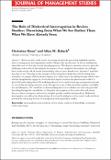Files in this item
The role of dialectical interrogation in review studies : theorizing from what we see rather than what we have already seen
Item metadata
| dc.contributor.author | Hoon, Christina | |
| dc.contributor.author | Baluch, Alina McCandless | |
| dc.date.accessioned | 2019-12-09T10:30:02Z | |
| dc.date.available | 2019-12-09T10:30:02Z | |
| dc.date.issued | 2020-08-15 | |
| dc.identifier | 263236236 | |
| dc.identifier | 472579c0-af86-4a84-976a-27746e6fe5a1 | |
| dc.identifier | 85076266669 | |
| dc.identifier | 000500773400001 | |
| dc.identifier.citation | Hoon , C & Baluch , A M 2020 , ' The role of dialectical interrogation in review studies : theorizing from what we see rather than what we have already seen ' , Journal of Management Studies , vol. 57 , no. 6 , pp. 1246-1271 . https://doi.org/10.1111/joms.12543 | en |
| dc.identifier.issn | 0022-2380 | |
| dc.identifier.other | ORCID: /0000-0002-6700-6891/work/66070031 | |
| dc.identifier.uri | https://hdl.handle.net/10023/19097 | |
| dc.description.abstract | Review‐centric works receive increasing attention for generating insightful contributions to management and organization studies. Despite this, the literature on theory building has taken little note of their place in the theorizing process. This deserves attention, however, given the challenges reviews face in theorizing in the absence of new empirical observations. Accordingly, these works run the risk of merely summarizing ‘what we have already seen’, instead of ‘maximizing what we see’. Drawing on the strategies of theorizing from similarities and theorizing from anomalies, we propose dialectical interrogation as a critical step in theorizing through which review scholars imaginatively engage in a back and forth inquiry between the phenomenal world of a given field and existing theory. By analyzing selected review studies from top management journals, we reveal that theorizing outcomes occur through two ways of dialectical interrogation (consolidative and disruptive). We contribute by demonstrating that review scholars can enter into powerful theorizing through the consolidative or disruptive interrogation of the review data with extant theory to detect emergence and novelty alongside puzzles, conflicts and paradoxes. Dialectical interrogation can address the shortcomings of current theorizing in review‐centric works and bears potential for advancing theories of management and organization studies. | |
| dc.format.extent | 26 | |
| dc.format.extent | 180170 | |
| dc.language.iso | eng | |
| dc.relation.ispartof | Journal of Management Studies | en |
| dc.subject | Meta-analysis | en |
| dc.subject | Meta-synthesis | en |
| dc.subject | Synthesis of knowledge | en |
| dc.subject | Review study | en |
| dc.subject | Systematic review | en |
| dc.subject | Theorizing | en |
| dc.subject | HD28 Management. Industrial Management | en |
| dc.subject | LB2300 Higher Education | en |
| dc.subject | 3rd-DAS | en |
| dc.subject | BDC | en |
| dc.subject | R2C | en |
| dc.subject.lcc | HD28 | en |
| dc.subject.lcc | LB2300 | en |
| dc.title | The role of dialectical interrogation in review studies : theorizing from what we see rather than what we have already seen | en |
| dc.type | Journal article | en |
| dc.contributor.institution | University of St Andrews. School of Management | en |
| dc.contributor.institution | University of St Andrews. Centre for the Study of Philanthropy & Public Good | en |
| dc.identifier.doi | 10.1111/joms.12543 | |
| dc.description.status | Peer reviewed | en |
This item appears in the following Collection(s)
Items in the St Andrews Research Repository are protected by copyright, with all rights reserved, unless otherwise indicated.

